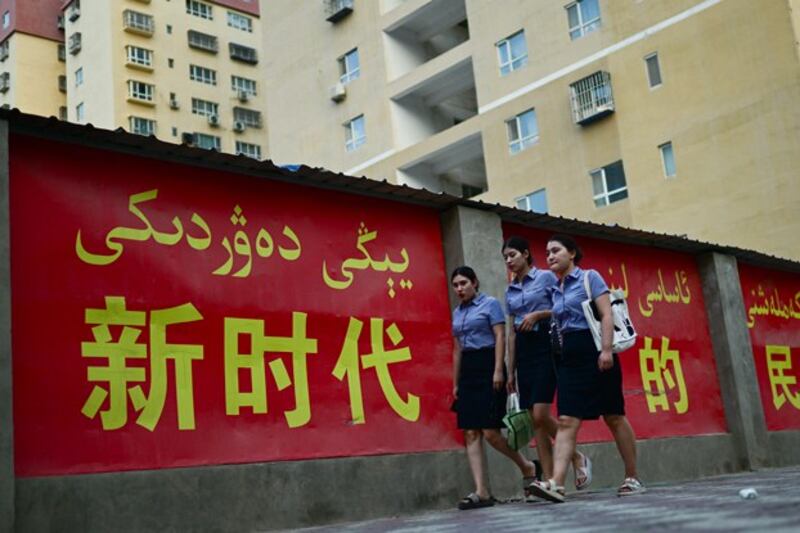In a joint statement, 51 countries, including the United States, expressed deep concern to the United Nations on Wednesday over Chinese human rights violations of Uyghurs in its far-western Xinjiang region.
The move comes after China was elected to the U.N. Human Rights Council for the 2024-2026 term – despite its poor track record in protecting rights.
"Members of Uyghur and other predominantly Muslim minorities in Xinjiang continue to suffer serious violations of their human rights by the authorities of the People's Republic of China," said the statement, which was delivered by James Kariuki, Britain's U.N. ambassador.
It urged China to respond to an August 2022 report issued by the U.N. Office of the High Commissioner for Human Rights, or OHCHR, which concluded China’s mass detentions of Uyghurs and other predominantly Muslim minorities on a large scale in Xinjiang “may constitute international crimes, in particular crimes against humanity.”
The report found that "serious human rights violations" have been committed in the Xinjiang Uyghur Autonomous Region amid the Chinese government's claims of countering terrorism and extremism.
The assessment cited evidence of invasive surveillance on the basis of religion and ethnicity, restrictions on cultural and religious practices, torture and ill-treatment of detainees, forced abortion and sterilization of Muslim women, enforced disappearances, family separations, and forced labor, the statement noted.
“Over a year has passed since that assessment was released and yet China has not engaged in any constructive discussion of these findings,” said the statement issued at the U.N.’s Third Committee, which meets annually in early October to deal with human rights, humanitarian affairs and social matters.
In its recommendations, the OHCHR had called on the Chinese government to release detainees from camps and other detention facilities, issue details about the location of Uyghurs in Xinjiang who have been out of touch with relatives abroad, allow travel so families can be reunited, and investigate allegations of human rights abuses.
‘Strong remedial action’
At the most recent session of the U.N’s Human Rights Council in September, Volker Türk, the current high commissioner for human rights, called on China to follow the recommendations of the assessment and take “strong remedial action.”
Maya Wang, associate director of the Asia division at Human Rights Watch, said maintaining pressure on China is part of a continued effort to hold the country accountable for its actions in Xinjiang.
“Suffice it to say that moving a government as abusive and powerful as China’s takes a lot of effort and time, and that pressing the U.N. to keep prioritizing human rights in its interactions with China is part of this long and hard effort,” she told Radio Free Asia.

The New York-based right group called on U.N. Secretary-General António Guterres on Monday to press Chinese President Xi Jinping to end crimes against humanity in Xinjiang and other serious rights abuses in China, during a visit to Beijing to attend the third Belt and Road Forum on Oct. 17-18.
"Since becoming secretary-general in 2017, Guterres has shown reluctance to publicly criticize the Chinese government for its severe and worsening repression," HRW said in a statement.
Growing number
Dolkun Isa, president of the World Uyghur Congress, welcomed the joint U.N. statement, noting that a few African and South American countries have signed this year’s statement condemning China’s atrocities against Uyghurs.
“In 2019, there were only 20 countries that signed on to the joint statement,” he said.
“Despite China’s efforts to spread disinformation to cover up it genocide against Uyghurs by increasing tourism, inviting friendly diplomats and journalists to the region, the fact that there are more countries signed on to this joint statement this time proves the complete failure of China’s disinformation campaign,” he said.
Luke de Pulford, executive director of Inter-parliamentary Alliance on China, said the latest statement should not be confused with action.
“We shouldn’t be fooled,” he told RFA. “It’s good that the U.K. should be applauded for taking some symbolic action, but these statements do not achieve accountability. It shouldn’t be confused and conflated with accountability.”
Xinjiang regional expert Adrian Zenz agreed that "writing a letter was good, but it cost you nothing," he tweeted on X, formerly known as Twitter.
“You are not paying any actual price for your values,” he wrote. “Actions speak louder than words. Actions could include: Effective forced labor ban. Legal atrocity determination. Sanctioning higher level officials.”
Translated by RFA Uyghur. Edited by Roseanne Gerin and Malcolm Foster.
